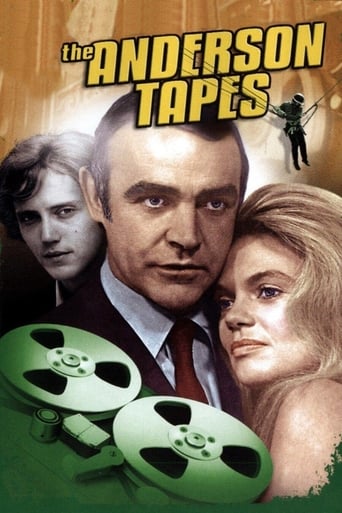

Good , But It Is Overrated By Some
... View Moreeverything you have heard about this movie is true.
... View MoreIf you're interested in the topic at hand, you should just watch it and judge yourself because the reviews have gone very biased by people that didn't even watch it and just hate (or love) the creator. I liked it, it was well written, narrated, and directed and it was about a topic that interests me.
... View MoreIt's simply great fun, a winsome film and an occasionally over-the-top luxury fantasy that never flags.
... View MoreSean Connery is a dedicated criminal, but not a thug, and he likes being the brains, but he prison time would suggest mixed results. He gets out again and chooses to rob a bunch of nice, rich white people in their plush apartment building where his gold digging ex-lover Dyan Cannon lives. The crew he sets up is experienced , but not very cohesive. The heist is pretty well planned, but problems rise and the plan gets broken up by a bed ridden boy and his Ham radio. Another Hammer from Wichita Falls, KS (sister city of Jersey City, NY) breaks through the bureaucracy and contacts the NYPD. The best imagine of the movie is how the NYPD has blocked off the street leaving the gang unaware of their presence.There's a lot of memorable performances like Alan King (mobster turned legit?), Martin Balsam (the gay advance man not cut out for crime), Val Avery (the brutal thug Socks), Chris Walken (in his film debut),Margaret Hamilton (in her last), Judith Lowry (who had to be the second oldest working actress of that time behind Estelle Winwood), Mr. Muscle Garrett Morris (as the recon team squad leader doing his own stunts) and Ralph Meeker (who may have advised Marlon Brando on what it's like to perform with cotton swabs in your mouth, obviously great). Director Sidney Lumet knows New York very well and everything in the planning and build up of the crime is audio taped by somebody, and these nice, rich white people are being spied on by several government agencies, but the robbery has nothing to do with what they are spying on so you can guess what happens to these illegal wire taps.
... View MoreDuke Anderson (Sean Connery) is an unrepentant thief just released from prison after 9 years. He reconnects with his old girlfriend Ingrid (Dyan Cannon) living in a rich apartment building. He plans to rob the entire building on Labor Day weekend. What he doesn't know is that there is surveillance everywhere, and his crew is surrounded.This director Sidney Lumet movie is trying to say that we're being monitored all the time. I don't think it was effectively inserted into this basic heist movie. I think the movie works a lot better without this over the top aspect. I also didn't like the clinky annoying sound effects, or the flash forward inserts. They keep breaking up any tension from the heist and the cops surrounding the building. It could have been a lot better.
... View MoreConnery's a long way from his glamorous, toupee-wearing, Bond role. But it's his strong presence that holds this crowded caper film together. The first part is pretty hard to follow. There's constant switching back and forth between assembling the gang and the many illegal surveillance set-ups by apparent law-enforcement agencies. Ironically, the agencies never catch on to the unfolding criminal plan they're eavesdropping on. Instead, they're surveilling the mob who's financing the heist.The heist itself is a nail-biter as the gang loots an upscale apartment building, while the cops try a little mountain climbing in order to trap them inside. What seems so unusual and realistic is how chaotic things become once the two encounter each other. It's like a medieval melee.Dyan Cannon gets a featured role as a silken mistress, while Martin Balsam minces along in stereotypical fashion as a gay art dealer and fence for the gang's stolen articles. Actually, I think the movie is one of the first to underscore the widespread use of hidden cameras to spy on people, a growing menace in our contemporary world. In my book, the best heist films are those with some sympathetic characters. Maybe working stiffs combining their individual skillls, like The Killing (1956), to make one big haul. That way the audience is torn between the characters and the law. Here, Pop and the kid are definitely sympathetic, while Haskins (Balsam) is lending his expertise. Anderson (Connery) is too tough and savvy to be sympathetic, but we respect him because he knows the score, as he spells out in a long denunciation of corrupt society. This means the robbers are not just robbers, but human beings, as well.Anyway, I understand this is Connery's favorite movie, maybe because it's so un-Bond-like, including the ending. As a heist film, it's certainly different, with several fairly memorable parts.
... View MoreWhen safecracker Sean Connery is let out of prison, he doesn't waste time; He begins planning a sure-fire way to make a quick fortune, and that includes using his old girlfriend (Dyan Cannon) to get access to her upper east side Manhattan apartment to rob the safes of the wealthy residents. What seemed like an easy robbery ends up like "Dog Day Afternoon" only with a private residence rather than a bank. What made that 1975 film so riveting was the subject matter behind the robbery (and the fact that it was a real-life crime) and the personal drama of the actual thieves. Here, the people are just greedy, and it is obvious how it will all play out.Poor Dyan Cannon has really no purpose here other than being a box office name, and she (like Elliot Gould) was terribly over-exposed after "Bob & Carol & Ted & Alice" with some less than memorable movies. The presence of some familiar character actors (Conrad Bain, Margaret Hamilton, Judith Lowry) and some humorous moments (Lowry, like she did on the TV series "Phyllis", has truly hysterical lines, especially one where she reveals a little secret about roommate Hamilton's reading material.) but little else to praise. A stereotypical early 70's gay character may raise eyebrows in this era of political correctness in movie and TV characterizations of homosexuals, but it is interesting to see that the gay character and Sean Connery have a truly affectionate camaraderie. A dumb Tor Johnson like brute (named "Socks") is added to give the thieves someone other than the gay character to make fun of and really adds no point other than "variety is the spice of life" when you want to do a home invasion.
... View More